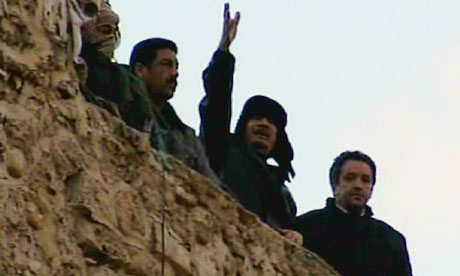• SAS on standby to rescue trapped Britons
• Leader says Libya will be 'red with fire'

British officials are contacting senior Libyan regime figures directly to persuade them to desert Muammar Gaddafi or face trial alongside him for crimes against humanity, the Guardian has learned.
With SAS troops and paratroopers on standby to rescue an estimated 150 Britons at workplaces in the Libyan desert, contingency measures were being drawn up to close the British embassy in Tripoli to pre-empt possible reprisals.
But the Foreign Office denied reports that the embassy would be closed as soon as this weekend. "We will react to the situation as it unfolds on the ground. If it gets too dangerous for our people to be there, of course we will pull them out of there. But are we planning to close the embassy down? No," a spokesman said. The US said it was closing its embassy in Tripoli as well as imposing limited unilateral sanctions on Libya.
The foreign secretary, William Hague, urged Britons still in Tripoli to board the last UK-sponsored chartered flight out of the capital at first light. He said HMS Cumberland would return to Benghazi on Sunday to pick up any remaining Britons there, but added that those in the desert remained Britain's biggest worry. All options were being considered, he said.
There were reports that two RAF helicopters had arrived in Malta in what may be the next stage of preparations to airlift some UK oil workers.
Britain's direct warnings to Libyan officials coincided with a joint British and French draft UN security council resolution the Libyan leadership to face war crimes prosecutions at the international criminal court for attacks on protesters. The resolution also called for travel bans and asset freezes for Libya's leaders.
Gaddafi showed no sign of heeding the warnings. Reports said that gunmen in cars in the capital, Tripoli, opened fire on protesters as they emerged from Friday prayers.
Nearby, in Green Square, the Libyan leader made another defiant televised appearance, promising to arm his supporters. "Retaliate against them, retaliate against them," he told a crowd of loyalists from the ramparts of a crusader fort overlooking the square. "Dance, sing and prepare. Prepare to defend Libya, to defend the oil, dignity and independence."
Wearing a fur-lined cap and sunglasses, and flanked by bodyguards, Gaddafi declared: "At the suitable time we will open the arms depot so all Libyans and tribes become armed, so that Libya becomes red with fire."
A vote on the UN resolution is not expected before next week. EU officials also discussed the possible imposition of punitive measures against the Gaddafi government, but stressed that any action would be led by decisions taken by the security council.
The steps under discussion fall a long way short of steps called for by some human rights groups, which wanted the UN to declare a no-fly zone over Libya if the regime continued to use warplanes to bomb or strafe demonstrators.
Mention of a no-fly zone was removed from the Franco-British draft , and an emergency Nato meeting in Brussels did not even discuss it as a contingency measure.
European officials said Russia and China would veto any such suggestions in the security council. They were also anxious about the timing of any punitive action, hoping to avoid a backlash against the many thousands of foreign workers still in the country, while seeking to maximise incentives for Gaddafi's supporters to defect.
Such defections seemed to be accelerating . Envoys to Portugal and Sweden renounced Gaddafi, with the ambassador to Lisbon, Ali Ibrahim Emdored, telling AP he was leaving "due to the killing of my people by this fascist regime".
In Geneva, the Libyan delegation to the UN human rights council called for a moment of silence in the chamber to "honour this revolution".
"We in the Libyan mission have categorically decided to serve as representatives of the Libyan people and their free will. We only represent the Libyan people," one envoy, Adel Shaltut, declared, drawing thunderous applause.
The 47-nation council unanimously declared that it "strongly condemns the recent gross and systematic human rights violations committed in Libya", calling for the launch of a UN human rights investigation into the bloodshed of the past few days. It took the unprecedented step of calling for Libya's membership to be revoked.
Hague, the US secretary of state, Hillary Clinton, and the EU foreign affairs chief, Lady Ashton, are due to fly to Geneva on Monday to promote the case for prosecutions of Libyan leaders by the international criminal court. The foreign secretary said: "The message is clear: that there will be a day of reckoning for those guilty of the appalling atrocities. The world will act together to hold them to account."
Such measures were decried as paltry by some organisations calling for immediate action to stop the bloodshed.
A coalition of more than 200 Arab organisations and 30 leading Arab intellectuals appealed for the imposition of a no-fly zone over Libya .
One of the signatories, the Egyptian writer and commentator Hani Shukrallah, said: "Stopping Gaddafi and his family shopping in Harrods or on the Champs Elysées is not going to prevent him unleashing further bloodshed.
"It's time to stop fiddling about and get serious."

 President Obama has
President Obama has 







